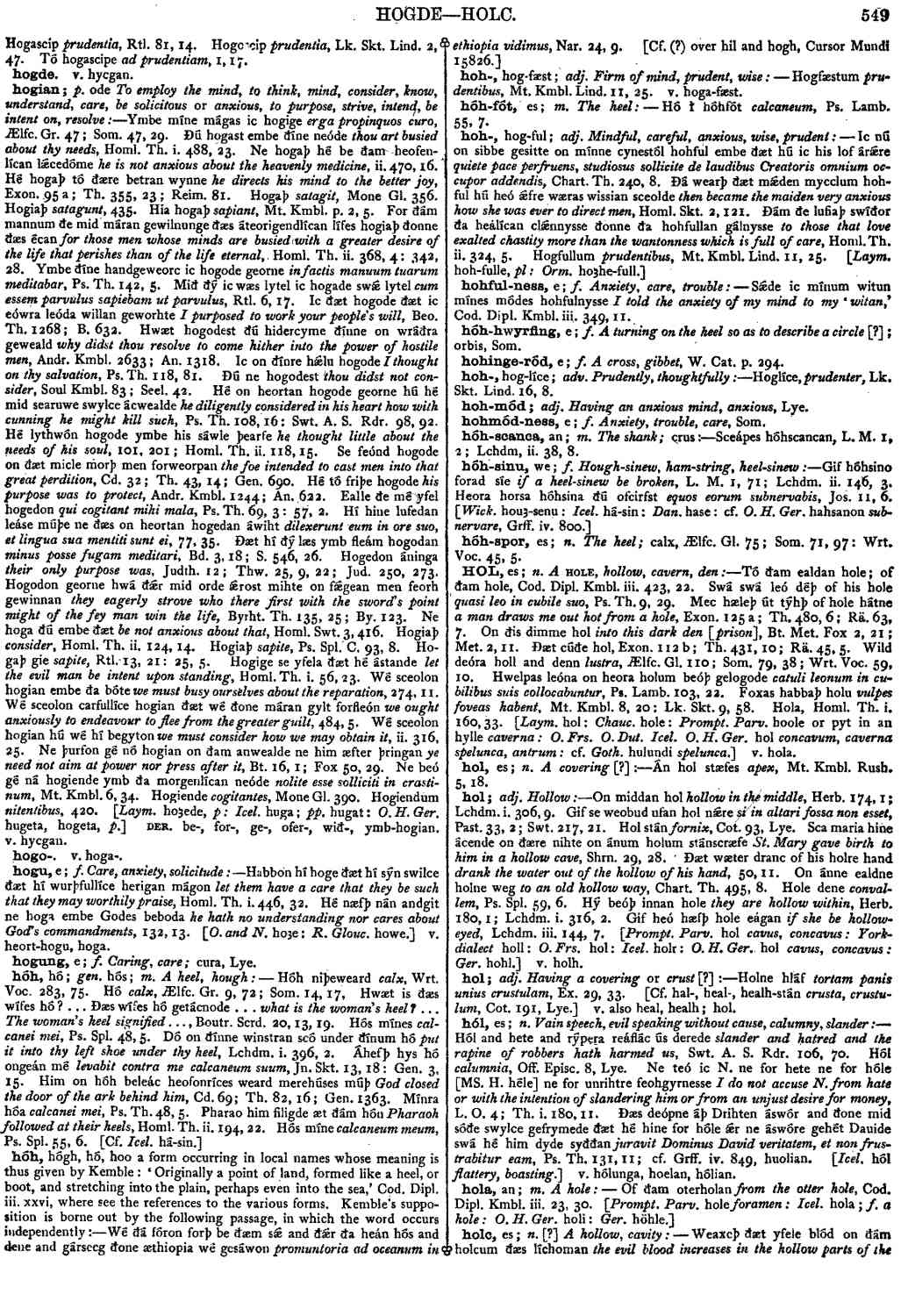hogian
- verb [ weak ]
-
Ymbe míne mágas ic hogige
erga propinquos curo,
- Ælfc. Gr. 47; Som. 47, 29.
-
Ðú hogast embe ðíne neóde
thou art busied about thy needs,
- Homl. Th. i. 488, 23.
-
Ne hogaþ hé be ðam heofenlícan lǽcedóme
he is not anxious about the heavenly medicine,
ii.- 470, 16.
-
Hé hogaþ tó ðære betran wynne
he directs his mind to the better joy,
- Exon. 95 a; Th. 355, 23; Reim. 81.
-
Hogaþ
satagit,
Mone- Gl. 356.
-
Hogiaþ
satagunt,
435. -
Hia hogaþ
sapiant,
- Mt. Kmbl. p. 2, 5.
-
For ðám mannum ðe mid máran gewilnunge ðæs áteorigendlícan lífes hogiaþ ðonne ðæs écan
for those men whose minds are busied with a greater desire of the life that perishes than of the life eternal,
- Homl. Th. ii. 368, 4: 342, 28.
-
Ymbe ðíne handgeweorc ic hogode georne
in factis manuum tuarum meditabar,
- Ps. Th. 142, 5.
-
Mið ðý ic wæs lytel ic hogade swǽ lytel
cum essem parvulus sapiebam ut parvulus,
- Rtl. 6, 17.
-
Ic ðæt hogode ðæt ic eówra leóda willan geworhte
I purposed to work your people's will,
- Beo. Th. 1268; B. 632.
-
Hwæt hogodest ðú hidercyme ðínne on wráðra geweald
why didst thou resolve to come hither into the power of hostile men,
- Andr. Kmbl. 2633; An. 1318.
-
Ic on ðínre hǽlu hogode
I thought on thy salvation,
- Ps. Th. 118, 81.
-
Ðú ne hogodest
thou didst not consider,
Soul- Kmbl. 83; Seel. 42.
-
Hé on heortan hogode georne hú hé mid searuwe swylce ácwealde
he diligently considered in his heart how with cunning he might kill such,
- Ps. Th. 108, 16: Swt. A. S. Rdr. 98, 92.
-
Hé lythwón hogode ymbe his sáwle þearfe
he thought little about the needs of his soul,
- 101, 201; Homl. Th. ii. 118, 15.
-
Se feónd hogode on ðæt micle morþ men forweorpan
the foe intended to cast men into that great perdition,
- Cd. 32; Th. 43, 14; Gen. 690.
-
Hé tó friþe hogode
his purpose was to protect,
- Andr. Kmbl. 1244; An. 622.
-
Ealle ðé mé yfel hogedon
qui cogitant mihi mala,
- Ps. Th. 69, 3: 57, 2.
-
Hí hine lufedan leáse múþe ne ðæs on heortan hogedan áwiht
dilexerunt eum in ore suo, et lingua sua mentiti sunt ei,
- 77, 35.
-
Ðæt hí ðý læs ymb fleám hogodan
minus posse fugam meditari,
- Bd. 3, 18; S. 546, 26.
-
Hogedon áninga
their only purpose was,
- Judth. 12; Thw. 25, 9, 22; Jud. 250, 273.
-
Hogodon georne hwá ðǽr mid orde ǽrost mihte on fǽgean men feorh gewinnan
they eagerly strove who there first with the sword's point might of the fey man win the life,
- Byrht. Th. 135, 25; By. 123.
-
Ne hoga ðú embe ðæt
be not anxious about that,
- Homl. Swt. 3, 416.
-
Hogiaþ
consider,
- Homl. Th. ii. 124, 14.
-
Hogiaþ
sapite,
- Ps. Spl. C. 93, 8.
-
Hogaþ gie
sapite,
- Rtl. 13, 21: 25, 5.
-
Hogige se yfela ðæt hé ástande
let the evil man be intent upon standing,
- Homl. Th. i. 56, 23.
-
Wé sceolon hogian embe ða bóte
we must busy ourselves about the reparation,
- 274, 11.
-
Wé sceolon carfullíce hogian ðæt we ðone máran gylt forfleón
we ought anxiously to endeavour to flee from the greater guilt,
- 484, 5.
-
Wé sceolon hogian hú wé hí begyton
we must consider how we may obtain it,
ii.- 316, 25.
-
Ne þurfon gé nó hogian on ðam anwealde ne him æfter þringan
ye need not aim at power nor press after it,
- Bt. 16, 1; Fox 50, 29.
-
Ne beó gé ná hogiende ymb ða morgenlícan neóde
nolite esse solliciti in crastinum,
- Mt. Kmbl. 6, 34.
-
Hogiende
cogitantes,
Mone- Gl. 390.
-
Hogiendum
nitentibus,
420.
Bosworth, Joseph. “hogian.” In An Anglo-Saxon Dictionary Online, edited by Thomas Northcote Toller, Christ Sean, and Ondřej Tichy. Prague: Faculty of Arts, Charles University, 2014. https://bosworthtoller.com/19419.
Checked: 0